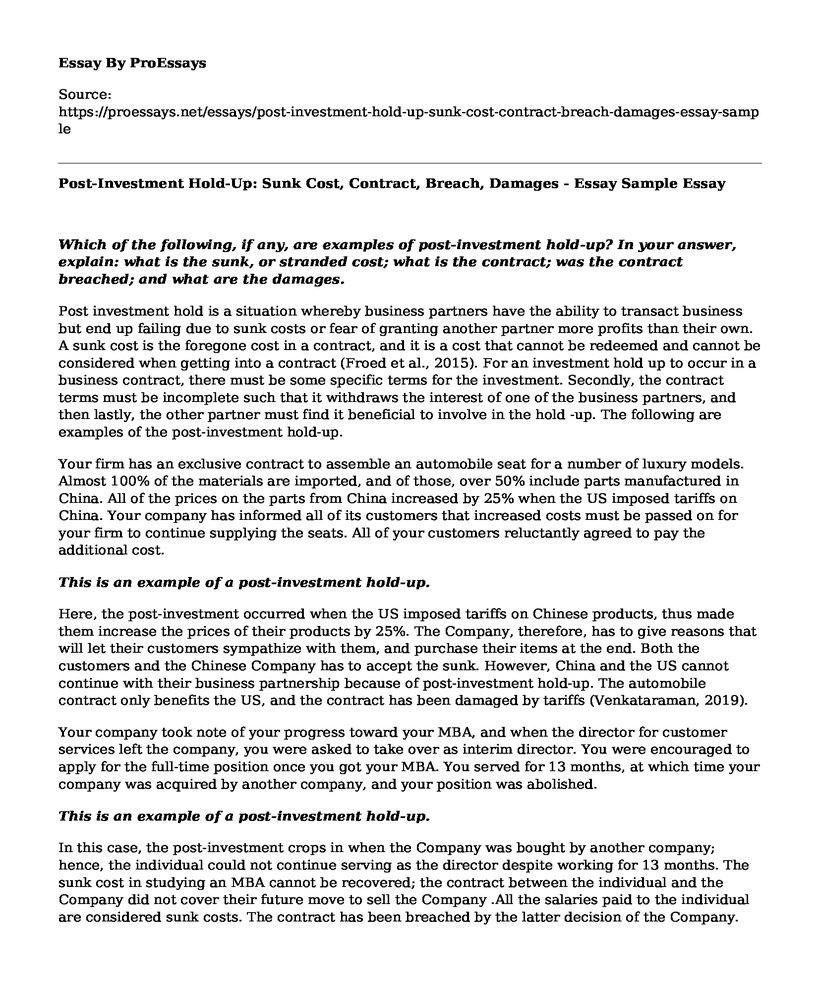Which of the following, if any, are examples of post-investment hold-up? In your answer, explain: what is the sunk, or stranded cost; what is the contract; was the contract breached; and what are the damages.
Post investment hold is a situation whereby business partners have the ability to transact business but end up failing due to sunk costs or fear of granting another partner more profits than their own. A sunk cost is the foregone cost in a contract, and it is a cost that cannot be redeemed and cannot be considered when getting into a contract (Froed et al., 2015). For an investment hold up to occur in a business contract, there must be some specific terms for the investment. Secondly, the contract terms must be incomplete such that it withdraws the interest of one of the business partners, and then lastly, the other partner must find it beneficial to involve in the hold -up. The following are examples of the post-investment hold-up.
Your firm has an exclusive contract to assemble an automobile seat for a number of luxury models. Almost 100% of the materials are imported, and of those, over 50% include parts manufactured in China. All of the prices on the parts from China increased by 25% when the US imposed tariffs on China. Your company has informed all of its customers that increased costs must be passed on for your firm to continue supplying the seats. All of your customers reluctantly agreed to pay the additional cost.
This is an example of a post-investment hold-up.
Here, the post-investment occurred when the US imposed tariffs on Chinese products, thus made them increase the prices of their products by 25%. The Company, therefore, has to give reasons that will let their customers sympathize with them, and purchase their items at the end. Both the customers and the Chinese Company has to accept the sunk. However, China and the US cannot continue with their business partnership because of post-investment hold-up. The automobile contract only benefits the US, and the contract has been damaged by tariffs (Venkataraman, 2019).
Your company took note of your progress toward your MBA, and when the director for customer services left the company, you were asked to take over as interim director. You were encouraged to apply for the full-time position once you got your MBA. You served for 13 months, at which time your company was acquired by another company, and your position was abolished.
This is an example of a post-investment hold-up.
In this case, the post-investment crops in when the Company was bought by another company; hence, the individual could not continue serving as the director despite working for 13 months. The sunk cost in studying an MBA cannot be recovered; the contract between the individual and the Company did not cover their future move to sell the Company .All the salaries paid to the individual are considered sunk costs. The contract has been breached by the latter decision of the Company.
References
Froeb, L. M., McCann, B. T., & Ward, M. R. (2015). Managerial economics. Cengage learning.
Venkataraman, S. (2019). The distinctive domain of entrepreneurship research. In Seminal Ideas for the Next Twenty-Five Years of Advances (pp. 5-20). Emerald Publishing Limited. Retrieved from https://doi.org/10.1108/S1074-754020190000021009
Cite this page
Post-Investment Hold-Up: Sunk Cost, Contract, Breach, Damages - Essay Sample. (2023, Feb 20). Retrieved from https://proessays.net/essays/post-investment-hold-up-sunk-cost-contract-breach-damages-essay-sample
If you are the original author of this essay and no longer wish to have it published on the ProEssays website, please click below to request its removal:
- How Can the Word Bank Help Solve the Issue of Literacy in Niger?
- Evaluating an Integrated Marketing Communication Program of Walmart
- Questions and Answers on Preferred Stocks Paper Example
- Essay Sample on Coca-Cola and Tripple Bottom Line
- World Bank Loan Conditions - Research Paper
- Skimming Pricing Model: Explained by Samsung & Apple
- Essay Example on Americans Paying More for Healthcare: Unsustainable Costs and Limited Knowledge







